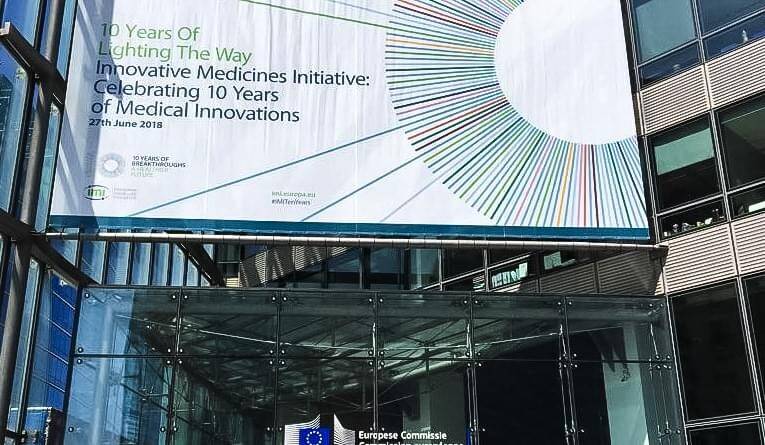New Antimicrobial Resistance (AMR) Accelerator Programme address the need to integrate blockchain into care and research.
Among other things, the topics aim to make clinical trials more patient-centric, contribute to medicines safety, and apply blockchain technologies to the drug development and health sectors.
– Our new Antimicrobial Resistance Accelerator programme represents a strategic, coordinated response to one of the biggest challenges facing the world today. Meanwhile the topics on digital health and the blockchain highlight IMI’s commitment to working with all sectors involved in healthcare – said Pierre Meulien, IMI Executive Director.
The two Calls for proposals (IMI2 – Calls 15 and 16) launched have a total budget of EUR 434 million. Around half of this comes from Horizon 2020, the EU’s framework programme for research and innovation. The other half comes from EFPIA companies and IMI Associated Partners.
[caption id="attachment_25075" align="aligncenter" width="765"] IMI is a partnership between the European Union and the European pharmaceutical industry, represented by the European Federation of Pharmaceutical Industries and Associations (EFPIA). It has a budget of €3.3 billion for the period 2014-2020.[/caption]
AMR Accelerator
The aim of the new IMI AMR Accelerator is to progress the development of new medicines to treat or even prevent resistant bacterial infections in Europe and worldwide. The programme comprises three pillars. A Capability Building Network will coordinate the programme and carry out research to strengthen the scientific basis in the AMR field, while the Tuberculosis Drug Development Network will work to accelerate the discovery of new combinations of drugs to treat TB. Finally, Portfolio Building Networks will support collaborative efforts to discover, develop and advance new and innovative agents to prevent or treat AMR. The scope of the AMR Accelerator is broad; under one structure, it will address many of the scientific challenges of AMR, and it will support the development of new ways to prevent AMR (including vaccines) and treatments (including new antibiotics). More broadly, the IMI AMR Accelerator also contributes to the European action plan on AMR, which includes a chapter on boosting research, development and innovation for AMR.
Clinical trials go digital
Current clinical trial assessments are often based on subjective clinical scoring systems, which do not provide an accurate, detailed picture of a patient’s condition. This topic aims to tackle this problem by identifying, assessing and validating digital technologies (e.g. wearable and home-based devices) that could reliably and sensitively measure patients’ clinical conditions in their homes or as they go about their daily lives. The project will focus its efforts on technologies capable of monitoring patients with neurodegenerative disorders (namely Parkinson’s disease and Huntington’s disease) and inflammatory diseases (rheumatoid arthritis or lupus, and inflammatory bowel disease). The project will ultimately result in better clinical trials that provide more detailed data on patients’ condition and also allow more patients to take part in clinical trials.
IMI is a partnership between the European Union and the European pharmaceutical industry, represented by the European Federation of Pharmaceutical Industries and Associations (EFPIA). It has a budget of €3.3 billion for the period 2014-2020.[/caption]
AMR Accelerator
The aim of the new IMI AMR Accelerator is to progress the development of new medicines to treat or even prevent resistant bacterial infections in Europe and worldwide. The programme comprises three pillars. A Capability Building Network will coordinate the programme and carry out research to strengthen the scientific basis in the AMR field, while the Tuberculosis Drug Development Network will work to accelerate the discovery of new combinations of drugs to treat TB. Finally, Portfolio Building Networks will support collaborative efforts to discover, develop and advance new and innovative agents to prevent or treat AMR. The scope of the AMR Accelerator is broad; under one structure, it will address many of the scientific challenges of AMR, and it will support the development of new ways to prevent AMR (including vaccines) and treatments (including new antibiotics). More broadly, the IMI AMR Accelerator also contributes to the European action plan on AMR, which includes a chapter on boosting research, development and innovation for AMR.
Clinical trials go digital
Current clinical trial assessments are often based on subjective clinical scoring systems, which do not provide an accurate, detailed picture of a patient’s condition. This topic aims to tackle this problem by identifying, assessing and validating digital technologies (e.g. wearable and home-based devices) that could reliably and sensitively measure patients’ clinical conditions in their homes or as they go about their daily lives. The project will focus its efforts on technologies capable of monitoring patients with neurodegenerative disorders (namely Parkinson’s disease and Huntington’s disease) and inflammatory diseases (rheumatoid arthritis or lupus, and inflammatory bowel disease). The project will ultimately result in better clinical trials that provide more detailed data on patients’ condition and also allow more patients to take part in clinical trials.
 IMI is a partnership between the European Union and the European pharmaceutical industry, represented by the European Federation of Pharmaceutical Industries and Associations (EFPIA). It has a budget of €3.3 billion for the period 2014-2020.[/caption]
AMR Accelerator
The aim of the new IMI AMR Accelerator is to progress the development of new medicines to treat or even prevent resistant bacterial infections in Europe and worldwide. The programme comprises three pillars. A Capability Building Network will coordinate the programme and carry out research to strengthen the scientific basis in the AMR field, while the Tuberculosis Drug Development Network will work to accelerate the discovery of new combinations of drugs to treat TB. Finally, Portfolio Building Networks will support collaborative efforts to discover, develop and advance new and innovative agents to prevent or treat AMR. The scope of the AMR Accelerator is broad; under one structure, it will address many of the scientific challenges of AMR, and it will support the development of new ways to prevent AMR (including vaccines) and treatments (including new antibiotics). More broadly, the IMI AMR Accelerator also contributes to the European action plan on AMR, which includes a chapter on boosting research, development and innovation for AMR.
Clinical trials go digital
Current clinical trial assessments are often based on subjective clinical scoring systems, which do not provide an accurate, detailed picture of a patient’s condition. This topic aims to tackle this problem by identifying, assessing and validating digital technologies (e.g. wearable and home-based devices) that could reliably and sensitively measure patients’ clinical conditions in their homes or as they go about their daily lives. The project will focus its efforts on technologies capable of monitoring patients with neurodegenerative disorders (namely Parkinson’s disease and Huntington’s disease) and inflammatory diseases (rheumatoid arthritis or lupus, and inflammatory bowel disease). The project will ultimately result in better clinical trials that provide more detailed data on patients’ condition and also allow more patients to take part in clinical trials.
IMI is a partnership between the European Union and the European pharmaceutical industry, represented by the European Federation of Pharmaceutical Industries and Associations (EFPIA). It has a budget of €3.3 billion for the period 2014-2020.[/caption]
AMR Accelerator
The aim of the new IMI AMR Accelerator is to progress the development of new medicines to treat or even prevent resistant bacterial infections in Europe and worldwide. The programme comprises three pillars. A Capability Building Network will coordinate the programme and carry out research to strengthen the scientific basis in the AMR field, while the Tuberculosis Drug Development Network will work to accelerate the discovery of new combinations of drugs to treat TB. Finally, Portfolio Building Networks will support collaborative efforts to discover, develop and advance new and innovative agents to prevent or treat AMR. The scope of the AMR Accelerator is broad; under one structure, it will address many of the scientific challenges of AMR, and it will support the development of new ways to prevent AMR (including vaccines) and treatments (including new antibiotics). More broadly, the IMI AMR Accelerator also contributes to the European action plan on AMR, which includes a chapter on boosting research, development and innovation for AMR.
Clinical trials go digital
Current clinical trial assessments are often based on subjective clinical scoring systems, which do not provide an accurate, detailed picture of a patient’s condition. This topic aims to tackle this problem by identifying, assessing and validating digital technologies (e.g. wearable and home-based devices) that could reliably and sensitively measure patients’ clinical conditions in their homes or as they go about their daily lives. The project will focus its efforts on technologies capable of monitoring patients with neurodegenerative disorders (namely Parkinson’s disease and Huntington’s disease) and inflammatory diseases (rheumatoid arthritis or lupus, and inflammatory bowel disease). The project will ultimately result in better clinical trials that provide more detailed data on patients’ condition and also allow more patients to take part in clinical trials.
The aim is to establish a common blockchain ecosystem for pharmaceutical development, manufacturing and distribution.Bringing the blockchain into healthcare This topic aims to establish a common blockchain ecosystem for pharmaceutical development, manufacturing and distribution. By bringing together all parties, including patients, healthcare providers and health authorities, it will establish an agreed framework and reference implementation that addresses data integrity, security and privacy as well as regulatory compliance and efficiency. This framework will act as an integration layer linking underlying blockchain technologies with specific business applications in areas such as the supply chain, clinical development, and health data. Long-term impacts of the project will be greater trust between all participants in the sector and the more efficient use of resources. Research platforms for patient-centric drug development Currently, clinical trials are generally carried out in silos and all too often, they are not patient friendly, making it hard to enroll enough patients. This topic aims to develop and disseminate reusable best practices, tools and guidelines for establishing multi-company platform trials capable of running patient-friendly clinical trials that test multiple treatments in parallel. The topic focuses on developing platform trial designs and protocols in four disease areas: major depressive disorder, tuberculosis, the liver disease non-alcoholic steatohepatitis (NASH), and neurofibromatosis. In the short term, the research platforms will speed up the enrolment of patients in clinical trials and increase the likelihood that participating patients are allocated a promising treatment instead of the placebo. In the longer term, this will help to accelerate medicines development. About IMI The Innovative Medicines Initiative (IMI) is working to improve health by speeding up the development of, and patient access to, the next generation of medicines, particularly in areas where there is an unmet medical or social need. IMI is a partnership between the European Union and the European pharmaceutical industry, represented by the European Federation of Pharmaceutical Industries and Associations (EFPIA). Through the IMI2 programme, IMI has a budget of €3.3 billion for the period 2014-2020. Deadline for short proposals: 24 October 2018 Find more information about IMI2 – Call 15 and IMI2 – Call 16






